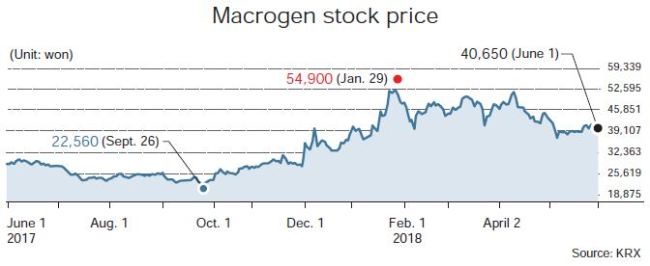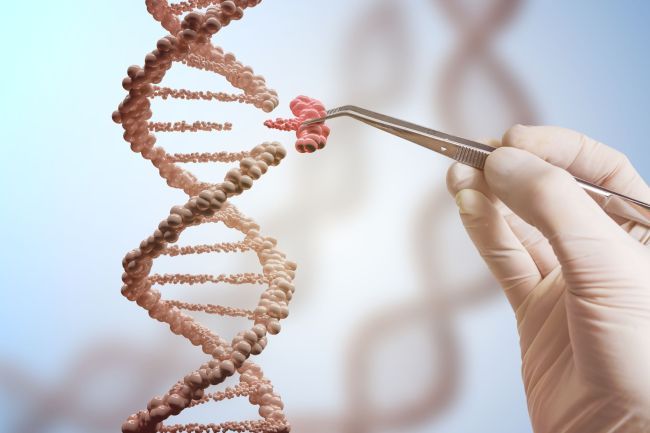This is the 56th in a series of articles analyzing major companies traded on the tech-heavy Kosdaq market. -- Ed.
Only two decades ago, today’s genome sequencing technology sounded like magic.
Driven by growing interest in the mysteries of the human body and passion for finding a cure, the market for genome sequencing service market has doubled in eight years.
The price of the service also plummeted significantly in the 15 years leading to 2016, giving researchers easier access cost-wise to genome analyses. Genome sequencing lays a groundwork for genetic testing for research purposes, clinical trials and application on forensic studies.
The popularity of genome analysis also pushed a local firm Macrogen forward. Its market cap rose 45 percent in last five years.
And the oldest Kosdaq-listed bio venture appears to envision a stable future thanks to its unrivaled position -- 60 percent market share in Korea -- coupled with increasing demand for sequencing service at home and abroad.

Becoming the fifth in the world and the first in Korea to complete a whole-genome sequence of an individual human, Macrogen has offered researchers services that range from high-throughput sequencing to oligonucleotide synthesis, biochip analyses through microarray gene expression and genetically-engineered mouse production using genome editing scissors.
Of the entire revenue, some 90 percent came from DNA sequencing analyses -- either through capillary electrophoresis sequencing or next generation sequencing -- and bio informatics service.
The technology can be applied in treatment for diseases or disorders in reproductive health, oncology, mendelian inheritance, cardiovascular system, and more.
In the latest example published by American Association for Cancer Research in May, a method for whole exome and ribonucleic acid sequencing, supported by Macrogen, was used to identify biomarkers for lung squamous cell cancinoma and help patients optimize decisions for cancer therapy.
 |
(123rf) |
Macrogen has some 18,000 researcher customers from 153 countries. A database of human genomes it has accumulated will serve as an “upper edge” in technology related to practicing precision medicine, wrote Lee Sang-heon, an analyst at Hi Investment & Securities.
“As (Macrogen) secured a database from genome analyses, the company’s growth potential is expected to materialize,” Lee wrote.
Lee estimated Macrogen’s 12-month price-to-earnings ratio in 2018 at 40.5, up from 2017 estimate at 35.7.
As of end-2017, Macrogen’s net revenue jumped 12 percent to 101.8 billion won ($95.1 million), according to a regulatory filing. Its yearly net profit more than doubled on-year.
In the first quarter of 2018, Macrogen logged 2 billion won net profit, in sharp contrast to a 3.1 billion won net loss the previous year. Its operating profit in the first quarter came to 1.8 billion won, up 82.7 percent on-year.
Another market analyst, Lee Tal-mi of SK Securities, pinned higher hope on the growth of overseas units, citing a growing demand for its sequencing service for clinical trials. She projected a net income of Macrogen Corp., a corporation in Maryland, US, to reach 35 billion won, up from 2 billion won in 2014.
The company has faced a regulatory roadblock in Korea in regards to the use of DNA sequencing technology for research. But in February, the Korean government rolled out plans to allow by the end of 2018 the use of genome sequencing for all diseases. Under Korean law, the use of sequencing is limited to incurable diseases like cancer, genetic disorders and acquired immune deficiency syndrome.
As of Friday, Macrogen’s market cap came to 430.7 billion won ($400 million), while trading at 40,650 won per share. The share price peaked at 54,900 won in late January this year. Some 3.4 percent of Macrogen shares were owned by offshore investors.
Headquartered in Seoul, Macrogen has 64 researchers out of 375 employees as of March 2018. The cost of research and development took up 5 percent of the net revenue in the first quarter this year.
Macrogen was founded in 1997 after incubating in Seoul National University.
Seo Jeong-sun, founder and chairman of Macrogen, was a medical professor at Seoul National University. He currently owns 8.56 percent of the company.
By Son Ji-hyoung
(
consnow@heraldcorp.com)








![[Today’s K-pop] Blackpink’s Jennie, Lisa invited to Coachella as solo acts](http://res.heraldm.com/phpwas/restmb_idxmake.php?idx=644&simg=/content/image/2024/11/21/20241121050099_0.jpg)
